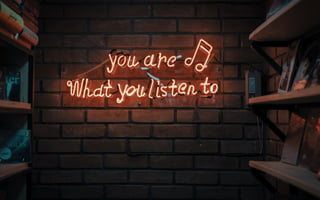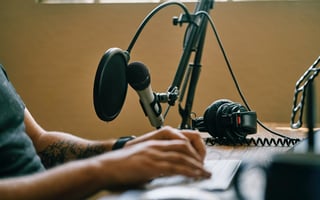Podcasts are booming and businesses are turning to them to add variety and bring a human voice to...
What makes a good podcast interview?
It is a question often asked during our media training courses as the format continues to grow.
Being invited to appear on a podcast is not the same as being asked to go into a radio studio and give a live interview.
While it may appear more relaxed, the format can still feel daunting.
And the longer format allows plenty of opportunity to explore challenging areas in depth.
So, how can spokespeople be great podcast guests?
One entrepreneur recently gave a great example of how to do it.
Tom Beahon is the co-founder of British sportswear brand Castore.
Launched in 2016, the company has gone from strength to strength and has partnerships with several Premier League football teams, the England and Wales Cricket Board, Formula One champions Red Bull and tennis star Andy Murray.
But the rise to the top has not always been smooth.
It made headlines after Aston Villa players complained about the weight of the shirts and their supposed inability to deal with perspiration. The criticism led to speculation the club would look to end the partnership.
Newcastle United defended the company’s kits after rumours suggested its partnership with Castore was ended over concerns about quality.
And these were topics that came up when Mr Beahon appeared on The Price of Football podcast, with hosts Kevin Day and Kieran Maguire.
Today's @POF_POD with @kevinhunterday is an interview with Tom Beahon, co founder of @CastoreEngland on how he & his brother turned an idea into a sportswear business challenging Adidas, Nike & Puma in less than a decade.
— Kieran Maguire (@KieranMaguire) April 12, 2024
🍎 https://t.co/49blAvB2Fq
🎧 https://t.co/Cb42Sc1XqR
Here’s what he said about those controversies:
“Whenever you are trying to be disruptive, bumps in the road are inevitable. You have to have a level of humility. It is an interesting balance as an entrepreneur to be ambitious, and have huge, deep self-belief, but have the self-awareness to acknowledge where you do need to improve.
“We’ve grown Castore from zero to multiple hundreds of millions of revenue in a short period of time. You don’t do that perfectly. No-one does.
“I did say, slightly tongue in cheek, when I was asked by a journalist recently if the Aston Villa kit has affected performance that if it has, we should do that for all our teams because Villa are having their best season for a very long time.
“There is a serious point that you have to learn from these things. You can’t be hard-headed and say that ‘that is not our fault’.”
It’s a good answer. Acknowledging mistakes makes him appear humble, down-to-earth and honest.
At the same time, he puts the issues into context. There is even a touch of humour, which helps show his human side. And it feels conversational.
Storytelling
When we prepare spokespeople for podcast interviews, one of the things we stress is that the format allows much greater scope for sharing personal stories and anecdotes.
A radio interview could last two minutes. A podcast appearance might be closer to an hour.
Stories are an excellent way for interviewees to add credibility to their argument, bring messages to life and build a connection with listeners.
And it was something Mr Beahon did well.
I particularly liked this anecdote about the company’s rise to prominence.
“We’ve been described as an ‘overnight success’,” he said.
“It didn’t feel like an overnight success when I was moving back in with my mum and dad as all of my friends were buying houses and paying myself £1,000 a month for the first couple of years as we tried to get the business off the ground.”
Asked about what has driven that success, the former professional footballer said: “For us, a big part of it was necessity. I didn’t want my life to be how it was. I wanted my life to be better than how it was, failing as a professional footballer. I didn’t want that to define me.
“So, there was a real drive there that I need to be successful, and I need to make a success of myself, no matter what.”
These stories help him to appear down-to-earth and relatable. Listeners feel they are seeing some of the person behind the brand.
He was also passionate throughout, drawing people into what he had to say.
And he made the complex seem simple to understand, particularly when explaining why football is an attractive market.
“A finance person would say that football has incredibly attractive market characteristics,” he said.
“You have captive audiences. Fans don’t change the team they support. That is true of almost no other consumer brand.
“Louis Vuitton is one of the most powerful brands in the world, but most of their customers will also own a Chanel handbag. Apple is one of the most powerful brands in the world, but most of its customers will also own something from Intel, HP or Samsung.
“You’ve also got unique intellectual property to the point where football fans will get their team’s logo tattooed on their bodies – that is not something you see for Apple or Louis Vuitton”.
We always stress during our media training courses that spokespeople must be prepared to face questions about other topical issues. And that rule applies to podcast interviews.
As the boss of a sportswear manufacturer, it was little surprise that the podcast sought his views on the Nike England’s kit row, which was driven by its “playful” redesign of the St George’s Cross.
“I suspect Nike were not too disappointed about the furore,” he said. “It’s people talking about them. It’s their name in the media.”
And he then moved on to what it means to be a disruptor – a term both Nike and Castore use to describe their kit designs. Much safer ground.
Journalists – and podcast hosts – also like to speculate on what could happen in the future.
So, it was not a shock he was asked if he would like his company to one day become the England kit supplier.
“The short answer is yes,” he said.
“I spoke earlier about not being emotive about these partnerships. I have to make level-headed, data-driven decisions. I’m not a gambler hoping this team might qualify for the Champions League and therefore I’ll pay them a big fee and pray they do qualify.
“You do not build a sustainably successful business by doing that. We have to be clear-headed and logical in our decision-making, believing we can add value.
“But I couldn’t look you in the eye and say the chance for someone who started a business in England, who loves football, who loves sport, to one day be the partner of the national team, that would clearly be very special.
“We do the Republic of Ireland at the moment, which is an amazing partnership. To evidence what I mentioned earlier about helping teams digitise their revenues, we sell significant volumes of product for Ireland in America.
“You’ve got huge cohorts of Irish Americans in Boston, Chicago, New York and, previously, no one had really thought about how we engage with that community. Castore has thought about that, and we have the infrastructure to engage and monetise that audience.”
It is an answer that tackles the question, explains the factors involved and then highlights the success they are having with another national team. Excellent.
One of the presenters had said he was “slightly blown away” by the interview – he was not the only one.
Media First are media and communications training specialists with over 35 years of experience. We have a team of trainers, each with decades of experience working as journalists, presenters, communications coaches and media trainers.
Click here to find out more about our media training and our podcast production services.
Subscribe here to be among the first to receive our blogs.




